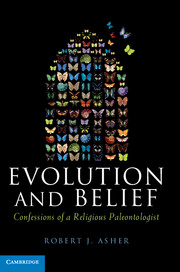Book contents
- Frontmatter
- Contents
- Acknowledgments
- Prologue
- One Science and Religion
- Two Evolution as a Science
- Three Characters and Common Descent
- Four The Fossil Record
- Five The Roots of Mammals
- Six A Brief History of Elephants
- Seven Whales are no Fluke
- Eight Creationism
- Nine DNA And The Tree pf Life
- Ten DNA and Information “Creation”
- Eleven Biology and Probability
- Twelve Evolution, Education, and Conclusions
- Notes
- Bibliography
- Index
Twelve - Evolution, Education, and Conclusions
Published online by Cambridge University Press: 05 March 2012
- Frontmatter
- Contents
- Acknowledgments
- Prologue
- One Science and Religion
- Two Evolution as a Science
- Three Characters and Common Descent
- Four The Fossil Record
- Five The Roots of Mammals
- Six A Brief History of Elephants
- Seven Whales are no Fluke
- Eight Creationism
- Nine DNA And The Tree pf Life
- Ten DNA and Information “Creation”
- Eleven Biology and Probability
- Twelve Evolution, Education, and Conclusions
- Notes
- Bibliography
- Index
Summary
I grew up in a conservative town in western New York state, about 350 miles northwest of Manhattan. During the early nineteenth century, the rural counties between Buffalo and Syracuse NY were known as the “burned over district” due to their revivalist religious zeal. Among the more famous evangelists of nineteenth-century New York state was Joseph Smith, founder of the Mormon Church. In terms of their more recent political history, western New Yorkers have sent such conservative Republicans as Tom Reynolds and Bill Paxon to represent them in the US Congress. In the US presidential elections of November 2008, several counties of western New York state gave the Republican ticket of John McCain and Sarah Palin a substantial majority, reaching close to 20 percentage points in some cases, compared to the national result in which Barack Obama won the popular vote by a “landslide” of 7%. Evangelical Christianity has a strong following in this part of the United States and played a very important role in my own youth.
At present, I’m a full-time academic at an elite British university and I’ve paid taxes to two different European governments over the past decade. By all accounts, I should have little in common socio-politically with the people of my hometown, but the fact is I do. For example, like many of my western New York neighbors, I can’t stand the idea of voting for political candidates sympathetic to trial lawyers who have litigated the US health care system into the world’s most expensive and least efficient. A lot of the men and women in my hometown are proud of the fact that they served in the US military, and have tried to foster democracy in Iraq and Afghanistan. I’m proud of them too. Politics are not one-dimensional, and the stereotypical dichotomy of rural Republican versus ex-pat liberal does not trump the down-to-earth pragmatism that characterizes the part of the United States where I grew up.
- Type
- Chapter
- Information
- Evolution and BeliefConfessions of a Religious Paleontologist, pp. 220 - 231Publisher: Cambridge University PressPrint publication year: 2012



